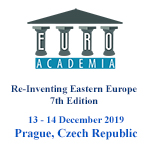Euroacademia Conferences
 Europe Inside-Out: Europe and Europeanness Exposed to Plural Observers (9th Edition) April 24 - 25, 2020
Europe Inside-Out: Europe and Europeanness Exposed to Plural Observers (9th Edition) April 24 - 25, 2020 Identities and Identifications: Politicized Uses of Collective Identities (9th Edition) June 12 - 13, 2020
Identities and Identifications: Politicized Uses of Collective Identities (9th Edition) June 12 - 13, 2020 8th Forum of Critical Studies: Asking Big Questions Again January 24 - 25, 2020
8th Forum of Critical Studies: Asking Big Questions Again January 24 - 25, 2020 Re-Inventing Eastern Europe (7th Edition) December 13 - 14, 2019
Re-Inventing Eastern Europe (7th Edition) December 13 - 14, 2019 The European Union and the Politicization of Europe (8th Edition) October 25 - 26, 2019
The European Union and the Politicization of Europe (8th Edition) October 25 - 26, 2019 Identities and Identifications: Politicized Uses of Collective Identities (8th Edition) June 28 - 29, 2019
Identities and Identifications: Politicized Uses of Collective Identities (8th Edition) June 28 - 29, 2019 The European Union and the Politicization of Europe (7th Edition) January 25 - 26, 2019
The European Union and the Politicization of Europe (7th Edition) January 25 - 26, 2019 7th Forum of Critical Studies: Asking Big Questions Again November 23 - 24, 2018
7th Forum of Critical Studies: Asking Big Questions Again November 23 - 24, 2018 Europe Inside-Out: Europe and Europeanness Exposed to Plural Observers (8th Edition) September 28 - 30, 2018
Europe Inside-Out: Europe and Europeanness Exposed to Plural Observers (8th Edition) September 28 - 30, 2018 Identities and Identifications: Politicized Uses of Collective Identities (7th Edition) June 14 - 15, 2018
Identities and Identifications: Politicized Uses of Collective Identities (7th Edition) June 14 - 15, 2018
Thinking on Art as a Sustainable Instrument of Cultural Diplomacy
-
-

-
Presentation speakers
- Ruth Bianco, Department of Visual Arts / Faculty for the Built Environment, University of Malta
- Download presentation
Abstract:
The notion of art as an effective instrument of cultural diplomacy is undervalued and not fully explored, even though cultural diplomacy has a long history and has surged over recent years. It is argued that this may be because the methods are not researched or analysed enough, underestimating the intrinsic potential that art may have in wielding ‘power’ and transforming negotiations. Critics also question whether traditional approaches of cultural diplomacy really work and how efficient they prove to be in the long term in changing the perception of a country or in improving or reaping better relations between nations. One of the problems has been the difficulty of measuring the impact on audiences of cultural activities over time, since art events may be short-lived and not so effective in achieving more long-term mutual relations. In reality, the global cultural landscape has changed and with it the role of art in cultural diplomacy. New technologies, Internet and social media have radically impacted methods of exporting, exposing, negotiating and communicating culture across borders. Cultural diplomacy is a form of ‘marketing’ and the ubiquity of ITC has changed the way artists operate. Increasingly, artists, curators and cultural operators have been able to create their own instruments of cultural diplomacy, exploring independent negotiations and management electronically outside the formality or involvement of governmental or corporate structures. In truth, artists have always been independent ‘ambassadors’ of culture through their expression and exhibitions. Art as an instrument of cultural diplomacy performs in rampant ways fostering multifarious forms of intercultural dialogue. Beyond the monetisation of art as an instrument of financial exchange, it needs to be looked at as an instrument for opening transformative spaces of inquiry, social interaction and participation, enculturation, education, research and dialogue as a means to promote betterment or policy-oriented solutions to issues affecting different nations, people and cultures. The Maltese government is investing in cultural ecologies including a newly developing infrastructure dedicated to contemporary art and internationalisation. The focus of this paper is to discuss the role of the contemporary art space as an instrumental tool harnessing new approaches of cultural diplomacy that engender sustainable and advantageous international relations; this whilst embracing curatorial practices that align with notions of alterity to effectively broker collective interests, present European values, and ‘unity in diversity’.
-
Related Presentations

The Visual Language of Neo-Nationalism: Patriotic Performance and Fashion in the Post-Communist Central European, Eurasia and Baltic States
- Anna Novikov

Approximation of the Legislation of Member States to EU Tax Policy: The Case Study of Estonia
- Mariam Jikia
- Irakli Gabisonia













